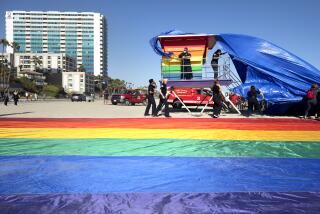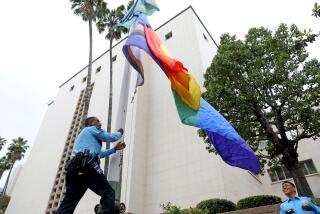Deaf Lifeguard, Fired by YMCA, Sues
- Share via
LONG BEACH — Stacy Adam has always had a special bond with the water.
It heightened her senses as she glided through a turquoise-tinted swimming pool in her childhood.
It provided the challenge that pushed her to succeed as a high school freshman on the swim team.
It nudged her to become an accredited lifeguard who, at 18, put in 20 to 30 hours a week at the Los Altos YMCA swimming pool in Long Beach.
But her much-loved job at the YMCA ended abruptly a year after it started when her supervisor pulled her aside to tell her she could no longer work as a lifeguard because she is deaf.
“I was speechless,” said Adam, 21, a student at Cypress Community College. “I didn’t know what to say.”
She decided to sue the YMCA of the USA, the YMCA of Greater Long Beach and the Los Altos YMCA last year in federal and state court.
If her case is not resolved in a final mediation conference set for March 31, it may go to trial. If it does, legal experts say, it will be the first time a court has been asked to decide whether deafness disqualifies a person to be a lifeguard.
Adam said she had no indication she would be fired when she walked into the Los Altos YMCA on Bellflower Boulevard on May 15, 1996, to do a CPR checkout. Her supervisor, she said, took her into an office and said she had recently become aware of the revised 1994 YMCA policy barring hiring deaf people as lifeguards. Adam said she was told that she could continue working as a swimming instructor, but she could not be a lifeguard.
Upset, Adam returned to her Long Beach home, expressing to her grandmother her anger and distress about being fired.
Her grandmother retrieved a newspaper article she had saved about another deaf lifeguard, David Schultz of Massachusetts, who sued the YMCA of the USA in early 1996. He claimed that the YMCA ended his lifeguard duties and revoked his certification after he had spent more than 16 years as a professional lifeguard and swimming instructor. A federal judge dismissed his case, and he is appealing.
Adam decided to follow Schultz’s example. In April 1997, she filed a state lawsuit claiming that the YMCA violated California’s Fair Employment and Housing Act. A month later, she filed a federal lawsuit seeking $12 million in damages, maintaining that the YMCA violated the Rehabilitation Act of 1973 and the Americans With Disabilities Act of 1990.
*
The YMCA of the USA said it rewrote its policy in 1994 to comply with the disabilities act. The new policy spelled out that the organization would no longer certify or hire deaf people as lifeguards, national YMCA officials said.
“Our assumption has always been implicit that lifeguards had to hear,” David Mercer, chief executive of the YMCA of the USA, said in an interview from his Chicago headquarters. “When the ADA came along, it required that specific job requirements be stated, and at that time we stated them.”
Mercer noted that the YMCA has 2,200 facilities in the United States that serve 7.5 million children a year who attend summer camps and swim. The organization does not want to jeopardize those children’s safety by employing deaf lifeguards, he said.
But people like Adam contend that hearing has nothing to do with their job performance. “I have never relied on my hearing to work as a lifeguard,” she said. “So why should I start now? I had other ways to know what is happening by visually checking. I think I was a little more aware of my surroundings.”
*
Adam claims she has worked harder than most to become a lifeguard. Not only is she certified as a lifeguard by the Red Cross and the YMCA, she is also a certified emergency medical technician. Having volunteered in the emergency room of a Glendale hospital, she has more medical and first-aid training than most lifeguards, she said.
“The problem is the categorical prohibition of deaf lifeguards,” said Marshall Caskey, one of two attorneys representing Adam. “You could make the same argument that all lifeguards should be men and should be strong. The individual should be looked at as an individual.”
One perplexing question is why Adam was hired in April 1995, one year after the YMCA rewrote its policy.
Attorney Zahava Stroud, who represents the Los Altos YMCA, declined to discuss the case in detail. But Mercer said Adam’s hiring “must have slipped by.”
Adam said she has no desire to return to the YMCA. All she wants is to give deaf people a chance to be judged as individuals, she said, and not automatically categorized as handicapped when trying to become lifeguards.
She may take heart in the story of lifeguard LeRoy Colombo. In 1974, the city of Galveston, Texas, awarded the 69-year-old man a plaque for saving 907 people from drowning between 1982 and 1991. He was deaf and could not speak.
More to Read
Sign up for Essential California
The most important California stories and recommendations in your inbox every morning.
You may occasionally receive promotional content from the Los Angeles Times.













